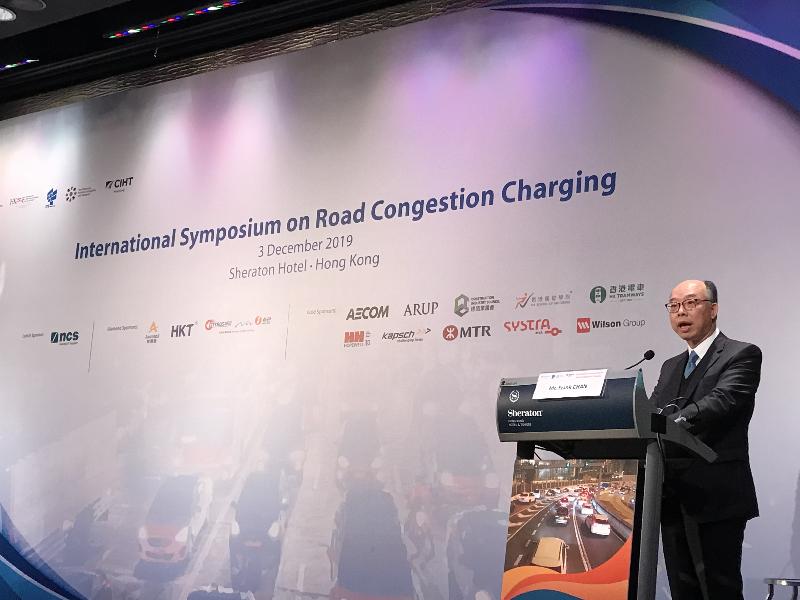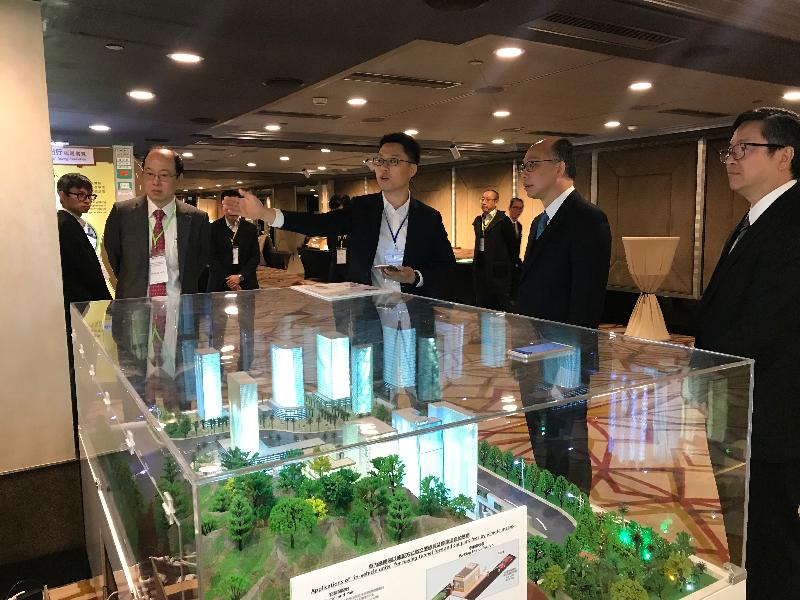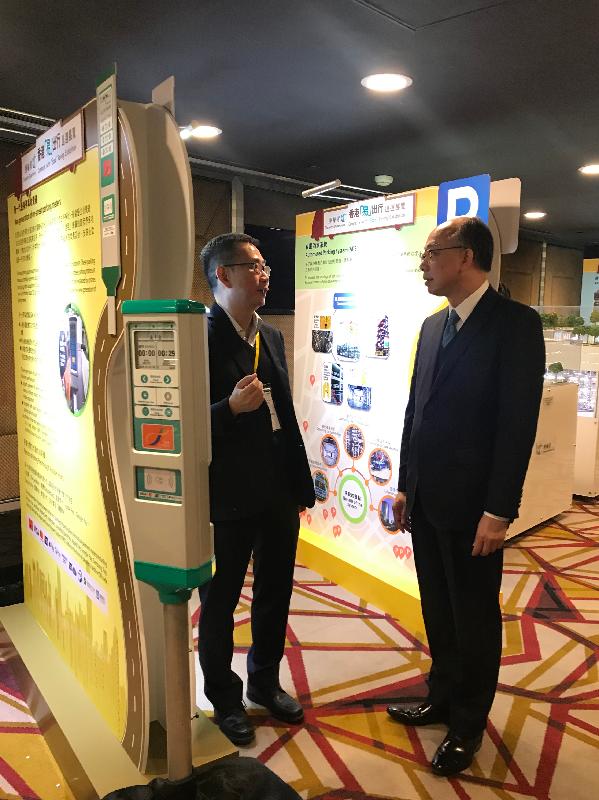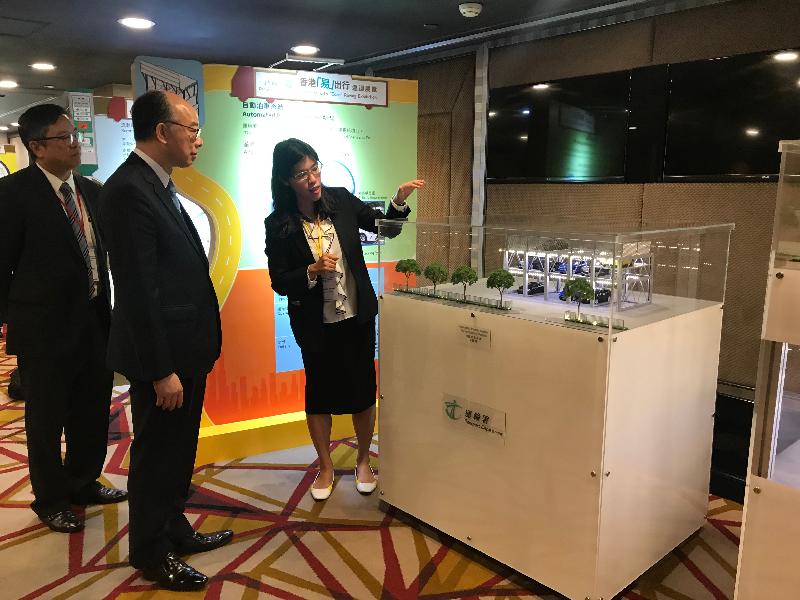Opening speech by STH at International Symposium on Road Congestion Charging (English only) (with photos)
******************************************************************************************
Professor Wong (Deputy Chairman of Hong Kong Institution of Engineers - Logistics and Transportation Division, Professor SC Wong), Commissioner Mable (Commissioner for Transport, Ms Mable Chan), distinguished guests, ladies and gentlemen,
Good morning. It is my great pleasure to join the symposium, where transport experts from home and abroad would share their insight and experience on Road Congestion Charging, an important topic that is probably on the agenda of every transport policy maker.
A transport system plays a pivotal role in facilitating the movement of people, goods and services. As a city develops with its growing population and economic activities, it counts on comprehensive and careful transport planning which, in my humble opinion, is underpinned by six major considerations, namely accessibility, carrying capacity, speed, safety, sustainability and affordability.
One must strike a delicate balance among these considerations in planning any transport network, especially for metropolises like London, Singapore and Tokyo. It is thus not surprising to see mass carriers such as railway topping the hierarchy in land transport systems in these cities, complemented by other transport modes like buses, trams, and taxis.
Similar to other metropolises, railway is the backbone underpinning Hong Kong's transport system. At present, the mass transit railway serves over 40 per cent of all passengers a day. The vision and planning blueprint of our railway network is expected to serve areas inhabited by 75 per cent of the local population and about 85 per cent of job opportunities. Still, railway cannot reach the doorstep of every household or office, and there comes the road that fills the gap.
As a city's population and economic activities grow, road congestion becomes commonplace. While a blockage of blood vessels can cause serious damage to bodily health, road congestion wears away a city's health by undermining its productivity, sustainability and quality of life. According to the INRIX 2018 Global Traffic Scorecard, each American lost roughly 100 hours due to congestion in 2018, costing about US$1,300 on average per driver. This means nearly US$87 billion in total for the entire nation. Time and financial costs aside, traffic jams are one of the culprits behind climate change. The stopping and starting of cars stuck in traffic jams burn fuel at a higher rate than when they are running smoothly on the road, and consequently leads to increases in carbon dioxide emissions and causes health concerns.
As one of the most densely populated metropolises, Hong Kong is not immune to traffic congestion. With an extensive and comprehensive coverage of its railway network, together with other public transport modes, about 90 per cent of commuting trips in Hong Kong involve the use of public transport, which translates into 12.9 million passenger trips every day. Indeed, the use of private vehicles in Hong Kong is more an option than a necessity. Our roads are amongst the most heavily used in the world, with over 360 vehicles per kilometre running during peak hours, compared to some 250 to 270 vehicles per kilometre in other metropolises like London and Singapore. Despite our continued efforts in enhancing our road infrastructure, the expansion of roads fails to catch up with car growth. Over the past decade, the number of licensed cars in Hong Kong has grown by 40 per cent, compared to a mere increase of 4 per cent in road length.
Several stretches of roads in Hong Kong are particularly congested. At peak hours, the vehicular speed in Central, our CBD, is only 10 kilometres per hour on average, slightly faster than walking. Furthermore, motor vehicles are the main source of air pollutants at street level and the second largest source of greenhouse gas emissions in Hong Kong. This is not sustainable and it calls for prompt actions.
In the face of aggravating traffic congestion in Hong Kong, road becomes a scarce utility which has to be optimised for use. One of the amicable solutions is to explore the application of "congestion charging" using a two-pronged approach. First, we charge vehicles based on an "Efficiency First" principle. In other words, we charge less for efficient people carriers such as buses, as well as vehicles that support economic activities such as goods vehicles. The overall goal is to enable more efficient use of our limited road space and to encourage motorists to make use of our efficient public transport service.
Second, we charge more for road sections that are heavily used, thereby encouraging drivers to change their commuting pattern through rethinking their driving need, changing their timing and routing of commuting, or even switching to the use of public transport.
We all appreciate that different cities adopt different measures to tackle congestion problems depending on their own traffic characteristics. Such measures include "car-pooling" schemes; access restrictions, road pricing, charges for polluting vehicles in low-emission zones; prohibition against vehicles with car plates ending with certain numbers from driving in the city centre on certain days, and even vehicle quota systems to name a few.
In Hong Kong, we are already applying the "Efficiency First" principle at government tolled tunnels. We are contemplating electronic road pricing in our CBD. Today, reputable speakers from overseas will share with us their successful experiences in implementing congestion charging at their hometowns. No doubt we all stand to benefit from their wisdom as we chart the way ahead.
Perhaps in a few decades, we will no longer have traffic jams thanks to technological advancements and smart-city solutions like adaptive traffic signals, autonomous vehicles and multi-modal solutions. But before we get there, we have to bite the bullet and look for pragmatic ways to address the problem. It is a daunting challenge but I am confident that we will find the right solution to cure the congestion problem for Hong Kong.
In closing, I would like to express my sincere gratitude to the four institutes which have helped put together such a timely and meaningful event. I would also like to thank the organising committee for making today's symposium a success. May I wish you all an enlightening and fruitful exchange, and for overseas guests, a pleasant stay in Hong Kong. Thank you.
Ends/Tuesday, December 3, 2019
Issued at HKT 14:36
Issued at HKT 14:36
NNNN






